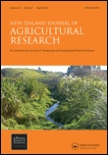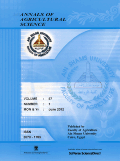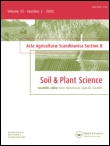
Landbauforschung-Journal of Sustainable and Organic Agricultural Systems
Scope & Guideline
Fostering a Greener Tomorrow through Agricultural Research
Introduction
Aims and Scopes
- Sustainable Agriculture Practices:
The journal emphasizes research on sustainable agricultural practices, including methods that minimize environmental impact while maintaining productivity. - Organic Farming Systems:
It explores organic farming systems, highlighting innovative techniques and practices that enhance soil health and biodiversity. - Integrated Pest Management (IPM) Strategies:
Research on IPM strategies is a core focus, aiming to reduce reliance on chemical pesticides through environmentally friendly alternatives. - Consumer Preferences and Market Dynamics:
The journal investigates consumer preferences towards sustainable and pesticide-free products, providing insights into market trends and consumer behavior. - Animal Nutrition and Feeding Innovations:
It also encompasses research on animal nutrition, including studies on alternative feed sources that contribute to sustainable livestock production.
Trending and Emerging
- Consumer Demand for Pesticide-Free Products:
There is an increasing focus on consumer preferences for pesticide-free agricultural products, reflecting a broader societal shift towards health consciousness and environmental sustainability. - Pesticide Reduction Strategies:
Research on strategies to reduce pesticide use, particularly through integrated pest management and alternative farming practices, is gaining traction as a critical area of study. - Biodiversity in Agricultural Landscapes:
Emerging studies on biodiversity within agricultural contexts suggest a growing recognition of its importance for ecosystem services and long-term agricultural sustainability. - Innovative Animal Feeding Practices:
The exploration of innovative animal feeding practices, such as the use of alternative protein sources, is becoming increasingly relevant in discussions around sustainable livestock production.
Declining or Waning
- Traditional Chemical Pesticide Use:
Research focused solely on traditional chemical pesticide applications is less frequent, as the trend shifts towards reducing chemical inputs in favor of sustainable alternatives. - Conventional Farming Practices:
There is a noticeable decrease in studies dedicated to conventional farming practices, as the emphasis grows on innovative and sustainable approaches. - General Agricultural Productivity Studies:
General studies on agricultural productivity without a sustainability lens are becoming less common, indicating a shift towards more specialized and sustainable research.
Similar Journals

INDIAN JOURNAL OF AGRICULTURAL SCIENCES
Advancing agricultural innovation for a sustainable future.Welcome to the Indian Journal of Agricultural Sciences, a vital resource for researchers and professionals in the field of agricultural sciences, published by the esteemed Indian Council of Agricultural Research. Established in 1974, this journal aims to disseminate high-quality research and developments in agronomy and crop science, facilitating knowledge exchange and advancement within the agricultural community. Though currently classified in the Q4 category according to 2023 data, it provides an essential platform for publication, contributing valuable insights towards sustainable agricultural practices. With an ISSN of 0019-5022 and an E-ISSN of 2394-3319, the journal houses important research that spans decades of convergence and collaboration, promoting innovation in agriculture across India and beyond. As an open access platform, it invites contributions that reflect a wide array of agricultural disciplines to foster sustainable food systems that address the challenges of food security. Join the network of scholars and practitioners by sharing your research and engaging with the profound work being done in this transformative field.

NJAS-Impact in Agricultural and Life Sciences
Exploring interdisciplinary research for a greener future.NJAS-Impact in Agricultural and Life Sciences is a pivotal open-access journal, published by Taylor & Francis Ltd, focusing on the interdisciplinary nexus between agricultural practices and life sciences. Anchored in the United Kingdom, this journal aims to provide a comprehensive platform for the dissemination of innovative research that addresses critical challenges in environmental sustainability, agricultural productivity, and biological advancements. With its inaugural issue dated from 2023 to 2024, NJAS prominently features the latest empirical studies, reviews, and theoretical contributions that enrich existing knowledge and provoke thought among researchers and practitioners alike. Although currently ranking within the lower percentiles across various Scopus categories, the journal aspires to establish itself as a significant contributor to the dialogue on agricultural and environmental sciences. As scholars in these fields seek to bridge the gaps in understanding, NJAS invites submission from diverse perspectives, underscoring the importance of collaborative knowledge-building in addressing the complexities of our changing global landscape.

NEW ZEALAND JOURNAL OF AGRICULTURAL RESEARCH
Shaping the Future of Agriculture with Rigorous ScienceNEW ZEALAND JOURNAL OF AGRICULTURAL RESEARCH is a prestigious, peer-reviewed journal published by Taylor & Francis Ltd that has been at the forefront of agricultural science since its inception in 1958. With a strong focus on the fields of Agronomy and Crop Science, Animal Science and Zoology, Plant Science, and Soil Science, this journal has established itself in the academic community, achieving a notable Q2 ranking in various agricultural categories as of 2023. The journal thrives on its commitment to disseminating cutting-edge research and innovative practices that address contemporary challenges in agriculture. Although it does not currently offer an open access option, its valuable contributions can be accessed through various academic platforms, ensuring that vital research reaches a wide audience of researchers, professionals, and students globally. The journal's continued relevance and authority are reflected in its strong Scopus rankings, further emphasizing its role as a critical journal within the agricultural sciences.

PAKISTAN JOURNAL OF AGRICULTURAL SCIENCES
Cultivating Knowledge for Sustainable AgricultureWelcome to the Pakistan Journal of Agricultural Sciences, a prominent platform for disseminating vital research findings in the fields of agronomy, crop science, food science, plant science, and soil science. Published by the prestigious University of Agriculture in Faisalabad, this journal aims to enhance the scientific discourse surrounding agricultural innovation and sustainability in Pakistan and beyond. With an ISSN of 0552-9034 and E-ISSN of 2076-0906, the journal serves as a valuable resource for researchers, professionals, and students interested in cutting-edge agricultural developments. As of 2023, the journal is ranked in the Q3 category for Agronomy and Crop Science as well as Food Science and positioned in Q4 for Plant and Soil Science, highlighting its growing impact within a competitive academic landscape. While the Pakistan Journal of Agricultural Sciences is not currently open access, it provides a comprehensive archive of research converging from 2011 to 2024, ensuring that critical knowledge remains accessible to those striving to advance the agricultural sciences. Join us in our mission to foster innovation and support sustainable practices in agriculture.

ANNALS OF AGRICULTURAL SCIENCES
Transforming Agricultural Science into Practical SolutionsANNALS OF AGRICULTURAL SCIENCES, published by Elsevier, stands as a leading open access journal dedicated to the multifaceted field of agricultural sciences. Since its inception in 2011, this journal has served as a pivotal platform for the dissemination of high-quality research, covering areas such as agronomy, animal science, horticulture, food science, plant science, and soil science. With an impressive Q1 ranking across multiple disciplines and notable positions in Scopus Ranks—including #6 in Animal Science and Zoology and #3 in Horticulture—this journal is recognized globally for its significant contribution to advancing agricultural innovations. The journal caters to a diverse audience of researchers, professionals, and students, providing them with open access to cutting-edge studies that address critical issues in agricultural productivity and sustainability. Its commitment to high-impact research ensures that articles contribute meaningfully to the scientific community, fostering advancements in agricultural practices and policies.

ITEA-Informacion Tecnica Economica Agraria
Bridging Theory and Practice in Agricultural SciencesITEA-Informacion Tecnica Economica Agraria, published by the ASOCIACION INTERPROFESIONAL DESARROLLO AGARIO, is a prominent journal dedicated to advancing the fields of agronomy, economics, horticulture, and veterinary science. Established in 2005, this journal plays a vital role in disseminating valuable research and insights in the technical and economic aspects of agricultural practices. While currently categorized in the Q4 quartile across various disciplines, including Agricultural and Biological Sciences and Econometrics, the journal seeks to contribute substantially to the body of knowledge with high-quality research that can guide policy-making and industry practices. The journal is based in Spain and is committed to supporting the growth and development of the agricultural sector through expert contributions. With its open-access policy, ITEA aims to provide unrestricted accessibility to its articles, ensuring that vital information reaches researchers, professionals, and students alike. By fostering collaboration and knowledge exchange within the academic community, ITEA stands as an essential platform for understanding and enhancing agricultural economics and technology.

ACTA AGRICULTURAE SCANDINAVICA SECTION B-SOIL AND PLANT SCIENCE
Empowering Researchers to Shape Sustainable Agricultural PracticesACTA AGRICULTURAE SCANDINAVICA SECTION B-SOIL AND PLANT SCIENCE, published by Taylor & Francis AS, is a distinguished journal dedicated to the fields of Agronomy, Crop Science, and Soil Science. With an impressive impact factor, and categorized in Q2 for both Agronomy and Crop Science and Soil Science as of 2023, this journal is an essential resource for researchers, professionals, and students aiming to advance their understanding of soil-plant interactions and sustainable agricultural practices. Operating since 1992 and continuing through to 2024, ACTA aims to publish high-quality, peer-reviewed research that encourages the applicability of advanced scientific knowledge in real-world agricultural settings. While the journal is not open access, it remains widely accessible through institutional subscriptions, reflecting its commitment to disseminating essential findings and fostering innovation in soil and plant science worldwide. Nestled in the vibrant academic environment of Norway, ACTA AGRICULTURAE SCANDINAVICA serves as a key platform for nurturing groundbreaking research that informs sustainable agricultural policies and practices globally.

Revista Ciencia Agronomica
Pioneering insights in agronomy and horticulture.Revista Ciencia Agronomica is a leading open access journal published by the Universidade Federal do Ceará, Departamento de Geociências, dedicated to advancing the field of agricultural sciences. Established in 2008, the journal has emerged as a significant platform for the dissemination of original research and innovative advancements in areas including agronomy, horticulture, and soil science, with a dedicated convergence of years extending to 2025. With an impactful presence in academic circles—ranking in Q3 for Agronomy and Crop Science and Soil Science and Q2 for Horticulture in 2023—this journal provides vital insights for researchers and practitioners alike. Although specific HIndex metrics are currently unavailable, the journal's Scopus rankings attest to its relevance, placing it in the 52nd, 44th, and 43rd percentiles across multiple pertinent categories. Since transitioning to an open access model in 2010, Revista Ciencia Agronomica has committed to maximizing the reach and impact of its published work, thereby ensuring valuable contributions to global agricultural knowledge.

Agrarforschung Schweiz
Driving progress in agriculture through open access and shared knowledge.Agrarforschung Schweiz is a premier journal dedicated to advancing the fields of agronomy, animal science, food science, and environmental studies. Published by AGRARFORSCHUNG in Switzerland, this journal serves as a vital platform for the dissemination of research findings that address contemporary challenges in agriculture and food systems. With an emphasis on open access, researchers and practitioners are encouraged to share their work, fostering a collaborative environment for knowledge exchange. Although currently listed in Q4 of several agricultural categories, the journal is poised for growth and aims to enhance its impact within the academic community. It features a wide range of topics from innovative agricultural practices to sustainability and pollution management, catering to a diverse audience of researchers, students, and industry professionals. Given the rich agricultural heritage of Switzerland, Agrarforschung Schweiz aspires to contribute meaningfully to global discussions and advancements in agricultural sciences through rigorous peer-reviewed research and insights.

Agrociencia Uruguay
Pioneering Agricultural Solutions from UruguayAgrociencia Uruguay, published by the Universidad de la República, Facultad de Agronomía, serves as a vital academic platform in the field of agricultural and biological sciences. Since its inception in 1997, this Open Access journal has fostered the dissemination of innovative research findings, promoting collaboration among researchers, professionals, and students interested in agronomy, crop science, soil science, and plant science. Operating from Montevideo, Uruguay, the journal strives to address contemporary challenges in agriculture through the publication of high-quality, peer-reviewed articles. Despite its relatively modest impact factors and rankings in Scopus, positioned in the lower percentiles, Agrociencia Uruguay remains crucial for advancing local and regional agricultural knowledge, thus contributing to global food security and sustainable practices. Researchers are encouraged to engage with the journal's content to further enhance their understanding and explore the rich agricultural landscape of Uruguay and beyond.